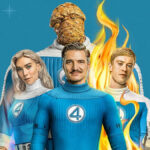Director Noah Baumbach’s latest film White Noise, adapted from Don DeLillo’s 1985 novel, is a darkly comedic look at an American family grappling with the absurdities and anxieties of modern life. Starring Adam Driver and Greta Gerwig, the movie blends existential dread with satirical wit as it explores themes of consumerism, academia, and an “airborne toxic event” that upends the protagonists’ lives.
If you enjoyed White Noise‘s surreal tone, genre-bending style, and philosophical underpinnings, here are 15 other films that similarly tackle life’s biggest questions through an absurdist lens. From metaphysical comedies to unsettling psychological thrillers, these movies will make you laugh, ponder, and perhaps see the world a little differently.
1. Stranger Than Fiction (2006)
Stranger Than Fiction stars Will Ferrell as Harold Crick, an IRS auditor who suddenly begins hearing a voice narrating his life and foreshadowing his impending death. As Harold frantically tries to find the narrator and save himself, he begins to question the meaning of his mundane existence.
Emma Thompson co-stars as Karen Eiffel, the eccentric author writing Harold’s story, while Dustin Hoffman plays a literature professor helping Harold understand his predicament. Marc Forster directs this inventive dramedy that playfully explores themes of free will, destiny, and the transformative power of art.
Stranger Than Fiction shares White Noise‘s fascination with characters trapped in systems beyond their control, whether it’s consumerism or a metafictional narrative. Both films use self-aware humor and surprising tonal shifts to probe existential quandaries.
2. Sorry to Bother You (2018)
Musician-turned-filmmaker Boots Riley made his directorial debut with this audacious satire about Cassius “Cash” Green (Lakeith Stanfield), a struggling telemarketer who ascends the corporate ladder after discovering he can adopt a “white voice” (dubbed by David Cross) to make sales.
As Cash’s career takes increasingly surreal turns, he becomes entangled with a sinister corporation and its deranged CEO (Armie Hammer). Tessa Thompson, Jermaine Fowler, Omari Hardwick, and Steven Yeun round out the ensemble cast.
Like White Noise, Sorry to Bother You takes aim at capitalism, consumerism, and the absurdity of modern work culture. Both films employ dark humor, sudden genre shifts, and bizarre plot developments to expose societal ills.
3. The Lobster (2015)
Greek filmmaker Yorgos Lanthimos co-wrote and directed this deadpan dystopian comedy set in a world where single people are sent to a hotel and given 45 days to find a romantic partner, lest they be transformed into an animal of their choice.
Colin Farrell stars as David, a recently divorced man who arrives at the hotel with his brother, now a dog. As David navigates the strict rules and surreal rituals of the hotel, he begins to question the entire system he’s trapped within. Rachel Weisz, John C. Reilly, and Léa Seydoux co-star.
The Lobster shares White Noise‘s bone-dry comedic sensibility, stylized dialogue, and allegorical storytelling. Both films create heightened realities to comment on conformity, relationships, and the search for meaning in an often absurd world.
4. Swiss Army Man (2016)
In Swiss Army Man, Paul Dano plays Hank, a man stranded on a deserted island who befriends a flatulent corpse named Manny (Daniel Radcliffe). As Hank teaches Manny about life and love, the two embark on a surreal journey of self-discovery and survival.
Written and directed by the filmmaking duo known as “Daniels” (Daniel Kwan and Daniel Scheinert), Swiss Army Man is a wholly original mix of buddy comedy, survival drama, and philosophical fable. Like White Noise, it uses an outlandish premise to explore deeper themes of mortality, identity, and human connection.
5. Melancholia (2011)
Danish auteur Lars von Trier wrote and directed this visually stunning meditation on depression and the end of the world. The film is divided into two parts, each centered around one of two sisters: Justine (Kirsten Dunst), who suffers from crippling melancholia, and Claire (Charlotte Gainsbourg), who tries to care for her while grappling with her own fears.
As a rogue planet named Melancholia hurtles towards Earth, the characters react in different ways to their impending doom. Kiefer Sutherland, Alexander Skarsgård, and John Hurt co-star.
Like White Noise, Melancholia juxtaposes intimate family drama with apocalyptic dread, finding dark humor and profound insights in the face of oblivion. Both films use impending catastrophe to examine characters’ psyches and relationships.
6. Being John Malkovich (1999)
Spike Jonze made his feature directorial debut with this mind-bending comedy written by Charlie Kaufman. John Cusack stars as Craig, a struggling puppeteer who discovers a portal into the mind of actor John Malkovich (playing himself). As Craig and his co-worker Maxine (Catherine Keener) start a business selling trips into Malkovich’s head, they become entangled in a love triangle with Craig’s wife Lotte (Cameron Diaz).
Being John Malkovich is a wildly inventive exploration of identity, celebrity, and the blurred lines between art and life. Like White Noise, it uses surreal humor and metaphysical conceits to probe the human condition.
7. Adaptation. (2002)
Screenwriter Charlie Kaufman and director Spike Jonze re-teamed for this meta-comedy loosely based on Susan Orlean’s non-fiction book “The Orchid Thief.” Nicolas Cage stars as both Charlie Kaufman and his (fictional) twin brother Donald, who are hired to adapt Orlean’s book into a screenplay.
As Charlie struggles with writer’s block and self-doubt, the film becomes a mind-bending meditation on the creative process, blurring the lines between reality and fiction. Meryl Streep co-stars as Orlean, with Chris Cooper as the eccentric orchid poacher John Laroche.
Like White Noise, Adaptation. is a self-reflexive work that uses irony, intertextuality, and unexpected shifts in tone and genre to comment on art, identity, and the human condition.
8. Eternal Sunshine of the Spotless Mind (2004)
Another collaboration between Charlie Kaufman and director Michel Gondry, Eternal Sunshine of the Spotless Mind stars Jim Carrey as Joel, a man who learns his ex-girlfriend Clementine (Kate Winslet) has undergone a procedure to erase him from her memory. Heartbroken, Joel decides to do the same, but as his memories of Clementine start to disappear, he realizes he wants to hold onto them.
This poignant sci-fi romance explores the nature of memory, identity, and the pain and joy of human connection. Like White Noise, it uses a high-concept premise to delve into complex philosophical and emotional territory.
9. Synecdoche, New York (2008)
Charlie Kaufman made his directorial debut with this ambitious, mind-bending drama about Caden Cotard (Philip Seymour Hoffman), a theater director who attempts to create a life-size replica of New York City inside a warehouse as part of a massive, ever-evolving play.
As the lines between Caden’s art and life blur, the film becomes a meditation on mortality, identity, and the search for meaning in a seemingly chaotic world. The ensemble cast includes Catherine Keener, Michelle Williams, Samantha Morton, and Emily Watson.
Like White Noise, Synecdoche, New York grapples with existential themes through a fragmented, non-linear narrative that challenges traditional storytelling conventions. Both films use absurdist humor and surreal imagery to probe the human condition.
10. The Truman Show (1998)
Directed by Peter Weir and written by Andrew Niccol, The Truman Show stars Jim Carrey as Truman Burbank, a man who unknowingly lives in a constructed reality television show, where his every move is broadcast to millions of viewers worldwide.
As Truman begins to suspect the truth about his existence, he embarks on a quest to escape the artificial world that has been created for him. Ed Harris co-stars as Christof, the creator of the show, with Laura Linney and Noah Emmerich as actors portraying Truman’s wife and best friend.
The Truman Show shares White Noise‘s interest in the blurred lines between reality and fiction, the influence of media on our lives, and the search for authenticity in a world of artifice.
11. Donnie Darko (2001)
Richard Kelly’s cult classic follows Donnie Darko (Jake Gyllenhaal), a troubled teenager who narrowly escapes death when a jet engine mysteriously crashes into his bedroom. Afterward, Donnie begins experiencing visions of a man in a rabbit suit named Frank, who tells him the world will end in 28 days.
As Donnie navigates high school, family drama, and his own psychological issues, he becomes increasingly convinced that he must fulfill a destiny involving time travel, alternate realities, and the fate of the universe. The ensemble cast includes Jena Malone, Drew Barrymore, and Patrick Swayze.
Like White Noise, Donnie Darko blends dark humor, existential dread, and mind-bending sci-fi concepts to explore themes of fate, free will, and the search for meaning in a seemingly chaotic world.
12. I Heart Huckabees (2004)
Director David O. Russell co-wrote this philosophical comedy with Jeff Baena, exploring themes of existentialism, environmentalism, and the interconnectedness of all things. Jason Schwartzman stars as Albert Markovski, an environmental activist who hires a pair of “existential detectives” (Lily Tomlin and Dustin Hoffman) to help him solve the meaning of his life.
Along the way, Albert becomes entangled with a corporate executive (Jude Law), his spokesmodel girlfriend (Naomi Watts), and a nihilistic philosopher (Mark Wahlberg) who opposes the detectives’ optimistic worldview.
I Heart Huckabees shares White Noise‘s absurdist humor, intellectual bent, and exploration of philosophical ideas through the lens of everyday life and relationships.
13. American Beauty (1999)
Sam Mendes made his feature directorial debut with this satirical drama written by Alan Ball. Kevin Spacey stars as Lester Burnham, a middle-aged advertising executive who becomes disillusioned with his suburban existence and decides to make drastic changes in his life.
As Lester quits his job, blackmails his boss, and becomes infatuated with his teenage daughter’s best friend (Mena Suvari), his wife Carolyn (Annette Bening) and daughter Jane (Thora Birch) grapple with their own crises and desires. Wes Bentley co-stars as Ricky Fitts, Jane’s enigmatic new neighbor who sees beauty in the mundane.
Like White Noise, American Beauty uses dark humor and stylized visuals to critique American consumerism, conformity, and the search for meaning in a seemingly perfect suburban landscape.
14. Magnolia (1999)
Paul Thomas Anderson’s sprawling ensemble drama follows multiple interconnected characters over the course of one day in Los Angeles. The cast includes Tom Cruise as a misogynistic self-help guru, Julianne Moore as a drug-addicted daughter, Philip Seymour Hoffman as a nurse caring for a dying man, and William H. Macy as a former quiz kid.
As the characters’ lives intersect and unravel, the film explores themes of chance, fate, and the search for forgiveness and connection in a fragmented world. The film’s climax features a surreal, biblically inspired event that ties the various storylines together.
Like White Noise, Magnolia uses a large ensemble cast, interwoven narratives, and elements of magical realism to probe the human condition and the strange, sometimes inexplicable nature of existence.
15. Punch-Drunk Love (2002)
Another Paul Thomas Anderson film, Punch-Drunk Love stars Adam Sandler as Barry Egan, a socially awkward entrepreneur who falls in love with his sister’s co-worker Lena (Emily Watson) while being extorted by a phone-sex line and pursued by violent thugs.
Featuring a percussive score by Jon Brion and vibrant cinematography by Robert Elswit, the film is a romantic comedy unlike any other, exploring the thin line between love and madness. Philip Seymour Hoffman co-stars as the villainous mattress salesman Dean Trumbell.
Punch-Drunk Love shares White Noise‘s off-kilter tone, quirky characters, and exploration of the absurdities and anxieties of modern life. Both films find humor and heart in the midst of chaos and dysfunction.
These 15 films, like White Noise, use unconventional storytelling, dark humor, and philosophical themes to examine the human condition in all its complexity and absurdity. Whether grappling with existential dread, the blurred lines between reality and fiction, or the search for meaning in a seemingly chaotic world, these movies offer unique and thought-provoking perspectives on life’s biggest questions. So if you enjoyed the surreal, cerebral journey of White Noise, these films are sure to provide similarly stimulating and entertaining viewing experiences.





